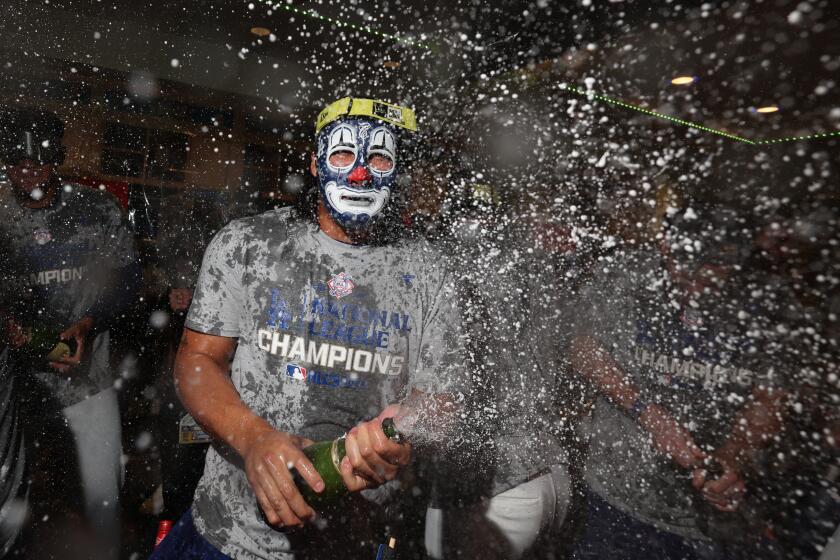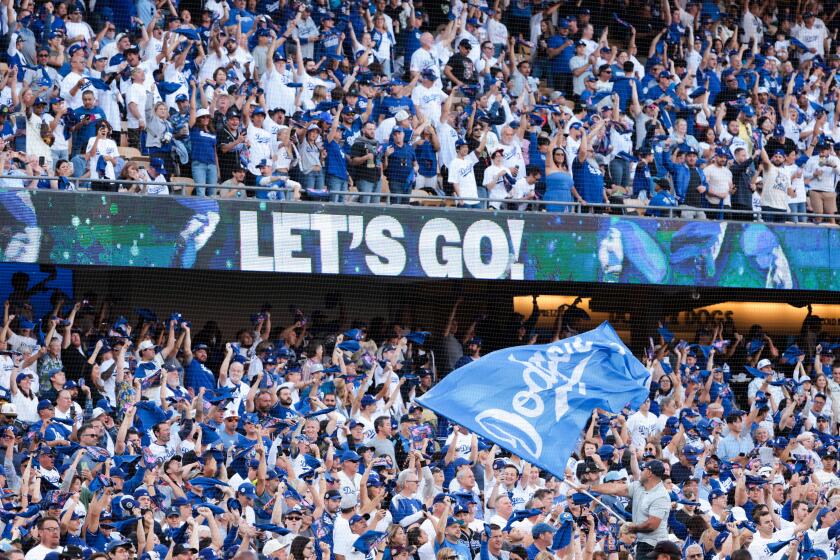What L.A. can learn from this year’s Dodgers

- Share via
My cousin from the nice part of the San Fernando Valley. A screenwriter pal who lives near the Sony lot. Academics and mechanics, Filipinos and Armenians and Latinos and plain ol’ white folks. Old and young, rich and working class.
On my social media feeds, all I’m seeing is my L.A. friends proclaiming their loyalty to the Dodgers. A bunch of them uploaded videos from Game 6 of the National League Championship Series, which the Blue Crew won against the New York Mets to secure a spot in the World Series.
Too many of them are asking if I can hook them up with a ticket to Game 1 on Friday (ustedes should know better — and the answer is, even I can’t get one).
Legendary L.A. artist Mister Cartoon was as surprised as anyone to see Dodgers players wearing his clown masks as they celebrated after beating the Mets to reach the World Series.
As an Orange County lifer with a somewhat objective vantage point on L.A., I’ve seen that nothing seems to unite the city in happiness like a winning Dodgers squad. I remember the thrill of the 1988 World Series run, the delight turned into disappointment over the 2017 and 2018 runner-up campaigns, the muted celebrations for the 2020 pandemic-era championship.
This year, there’s a joy like nothing I’ve ever seen.
The Dodgers will be playing the World Series in front of a home crowd for the first time since 2018 (2020 happened in Texas due to COVID restrictions), with Game 1 happening just days after the death of Fernando Valenzuela, perhaps the most magical Dodger of them all. Adding to the fervor is their opponent: the New York Yankees, the old Big Apple rival they’ve faced 11 times in the Fall Classic, though not in the last 43 years.
I also note something sad girding all this support. Los Angeles residents need something to believe in, because their city is in a fight for its life.
Political corruption, flash-mob robberies, street takeovers, busted sidewalks — what isn’t wrong with L.A. these days? The civic nerd in me bemoans how the folks who are wearing blue anything or hoisting team flags on their cars don’t show the same passion about the people who run Los Angeles, how they don’t grab paint rollers to cover up graffiti or dustpans to sweep up dirty streets the way they would hold on to a Kiké Hernández home run ball.
If those Dodgers fans shifted just a tenth of the fervor they show for the team toward building a better L.A., the city would be like a bigger, cooler Irvine.
But I’m also a sports nerd, so I understand why passion for a team doesn’t translate into passion for local politics. Besides, fans are always going to root for teams that are winners. Right now, L.A.’s leaders are as bumbling as Orange County’s Angels.
So let me challenge all y’all Dodgers fans to a happy medium: Make Los Angeles more like your team. One of baseball’s marquee franchises didn’t get to its exalted spot overnight. This year’s success is a culmination of winning strategies that L.A. can adopt — and that everyone can have a role in.

The most important, of course, is embracing diversity. From Jackie Robinson to Sandy Koufax, Valenzuela to Chan Ho Park, the Dodgers have long been pioneers in fostering talent that looked like the cities they played in. This year’s team continues that tradition by featuring players from across the world — Japan to the Caribbean, South America to Orange County. Black, white, Latino, Asian, they’re a reflection of the true multicultural society that Los Angeles claims it is.
To paraphrase an old baseball joke, the Dodgers are 25 guys who want to fit into one Uber, while L.A. remains a city of neighborhoods that each rides in its own car while not even knowing that others exist. A metropolis where Little Bangladesh barely knows anything about Tehrangeles and vice versa will never truly work, no matter how much boosters claim it does.
To sustain this unity, one must subsume one’s own needs for the greater good. The Dodgers have one of the greatest talents the game has ever seen in Shohei Ohtani, one of the best players in the big leagues in Mookie Betts, a perennial All-Star in Freddie Freeman and an injured legend in Clayton Kershaw.
Yet this team plays with the unity of a rowing crew and the abandon of Little Leaguers. Whatever egos there are in the clubhouse haven’t affected anything on the field — everyone knows his role and supports one other.
That’s not how Los Angeles has ever worked, sadly. It’s a city of competing visions and political machines, where access comes to those who play the game more than to those who actually want to do good. Everyone has a fiefdom that must be preserved at all costs, even if it means screwing over others.
Resale prices for the World Series between the Dodgers and New York Yankees at Dodger Stadium have soared, with prices climbing over $1,000 per ticket.
The Dodgers’ thrilling playoff run comes as Los Angeles faces a fiscal cliff. The city needs to pay a quarter of a billion dollars in liability costs through the first three months of this fiscal year alone, leading leaders to wonder where the money will come from. This comes on the heels of a report putting the price tag of solving homelessness in L.A. at nearly $22 billion, as the city prepares to help host the 2026 World Cup and the 2028 Summer Olympics.
These dire scenarios are your latest reminder that if you want to spend money, you should at least try to make money. The Dodgers have known this forever. Forbes doesn’t peg them as the second-most valuable baseball franchise, after those damned Yankees, just because their uniforms are so darn sleek.
No team has a better winning percentage over the last decade, which has led to league-leading attendance in most years. Fans are more than happy to pay $17 for a tall-boy can of beer or $35 for stadium parking at the gate — because they know their money is going toward making better teams and creating a fan experience with few rivals in professional sports.
L.A. City Hall, on the other hand, hasn’t given residents any reason to hope. Instead, elected officials and bureaucrats offer grandiose ideas, like making the Olympics car-free or closing off Wilshire Boulevard where it cuts through MacArthur Park. When public transit is making more news for assaults of passengers and drivers than effectiveness, and MacArthur Park remains plagued with gangs and drug dealers, does anyone really believe L.A.’s politicians can accomplish anything?

The Dodgers are not perfect, of course. Their continued refusal to erect a memorial to the barrios upon which Dodger Stadium was built contradicts the spirit of a city that wants to grapple with all of its history, comfortable and not. If the team doesn’t win the World Series this year, it’ll render this columna as relevant as former L.A. County Sheriff Alex Villanueva.
And yet, even if the Dodgers lose to the Yankees, they’ll remain a success. The fans will return next year, the team will swing for the proverbial fences yet again, most likely with another shot at winning the World Series.
They’re the most trusted brand in Los Angeles right now, while City Hall is little more than a joke with no punchline except the wallets of taxpayers.
Mayor Karen Bass was seen cheering for the Dodgers at Game 6. She should visit the team before Game 1 on Friday — except manager Dave Roberts and his guys should be giving her a pep talk on how to win, not the other way around.













